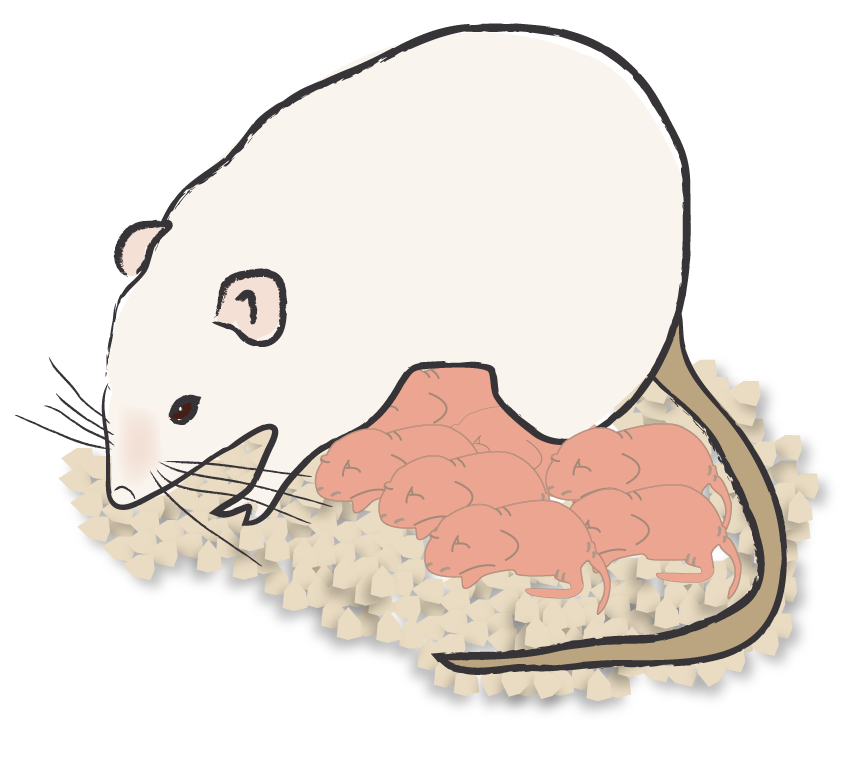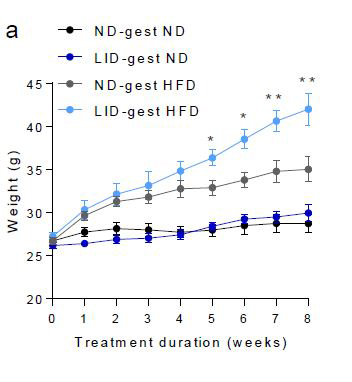
L’HYPOTHYROIDIE MATERNELLE : FACTEUR DE RISQUE DU DIABÈTE DE TYPE 2 CHEZ LA DESCENDANCE
Pendant la grossesse, une maladie métabolique ou un déséquilibre hormonal chez la mère peuvent altérer le développement et / ou la prolifération des cellules bêta chez le fœtus, entraînant un risque accru de développer un diabète de type 2 à l'âge adulte.
Bien que les hormones thyroïdiennes jouent un rôle important dans le développement du pancréas endocrinien fœtal, l'impact de l'hypothyroïdie maternelle qui survient chez 0,5% des femmes enceintes, sur l'homéostasie du glucose chez la progéniture adulte reste mal compris. Dans cette étude réalisée par l'équipe de Patrice Mollard à l'IGF, nous avons étudié cela à l'aide d'un modèle d'hypothyroïdie chez la souris, induit par l'administration d'un régime déficient en iode pendant la gestation.
Nous montrons que, lorsqu'elles sont nourries de nourriture normale, les souris adultes nées de mères hypothyroïdiennes sont plus tolérantes au glucose, on observe une hyperprolifération des cellules bêta et une sensibilité accrue à l'insuline. Cependant, après 8 semaines d'un régime riche en graisses, cette progéniture gagne 20% plus de poids corporel, devient profondément hyperinsulinémique, insulino-résistante et intolérante au glucose par rapport aux souris contrôles nées des mères euthyroïdiennes.
De plus, une modification du métabolisme du glucose est maintenue chez une deuxième génération d'animaux. Par conséquent, l'hypothyroïdie gestationnelle induit des altérations à long terme de la fonction du pancréas endocrinien, ce qui peut avoir des implications pour la prévention du diabète de type 2.

La descendance de mère hypothyroïdiennes pendant la gestation est plus sensible au stress métabolique.
(a) Courbes de poids post-initiation des différents régimes expérimentaux démontrant une prise de poids significativement plus importantes chez des mâles adultes (16-18 semaines) issus de mère hypothyroïdiennes pendant la gestation et soumis à un régime gras (n=5-8 souris/groupe, two-way ANOVA, les astérisques notent les différences entre LID-gest HFD et ND-gest HFD).
ND-gest ND, Régime normal (ND) pendant la gestation puis ND ; LID-gest ND, Régime faible en iode (LID) pendant la gestation puis ND ;
ND-gest HFD, ND pendant la gestation puis régime gras (HFD); LID-gest HFD, LID pendant la gestation puis HFD.
.........................................................................................................................................................................................................................................................................................................
MATERNAL HYPOTHYROIDISM: RISK FACTOR FOR TYPE 2 DIABETES IN OFFSPRING
During pregnancy, maternal metabolic disease and hormonal imbalance may alter fetal beta cell development and/or proliferation, thus leading to an increased risk for developing type 2 diabetes in adulthood.
Although thyroid hormones play an important role in fetal endocrine pancreas development, the impact of maternal hypothyroidism which occurs in 0.5% of all pregnant women, on glucose homeostasis in adult offspring remains poorly understood. In Patrice Mollard's team, we investigated this using a mouse model of hypothyroidism, induced by administration of an iodine-deficient diet during gestation. Here, we show that, when fed normal chow, adult mice born to hypothyroid mothers were more glucose-tolerant due to beta cell hyperproliferation and increased insulin sensitivity. However, following 8 weeks of high-fat feeding, these offspring gained 20% more body weight, became profoundly hyperinsulinaemic, insulin-resistant and glucose-intolerant compared with controls from euthyroid mothers. Furthermore, altered glucose metabolism was maintained in a second generation of animals. Therefore, gestational hypothyroidism induces long-term alterations in endocrine pancreas function, which may have implications for type 2 diabetes prevention in affected individuals.

Gestational hypothyroidism renders offspring more susceptible to metabolic stress. Adult male offspring (16–18 weeks of age) were analysed.
(a) Growth curve post initiation of feeding treatments showing increased weight gain in male offspring from hypothyroid mothers (n = 5–8 mice/group, two-way ANOVA;
asterisks denote differences between LID-gest HFD and ND-gest HFD groups).
ND-gest ND, ND during gestation then ND; LID-gest ND, LID during gestation then ND; ND-gest HFD, ND during gestation then HFD; LID-gest HFD, LID during gestation then HFD





